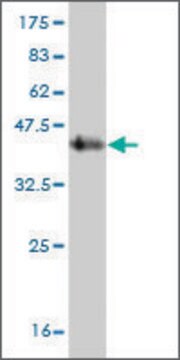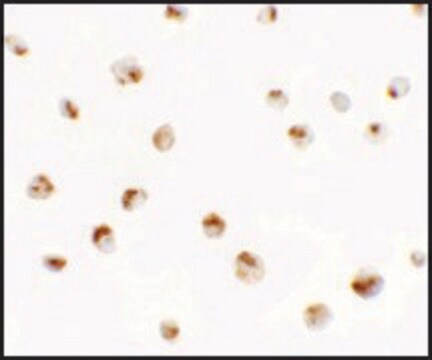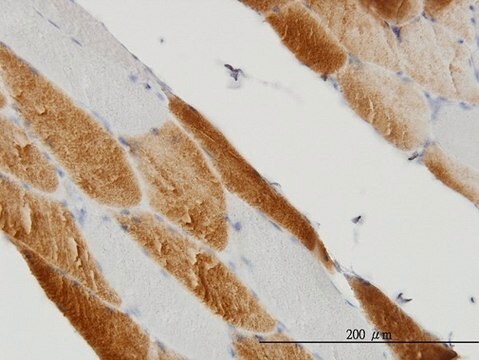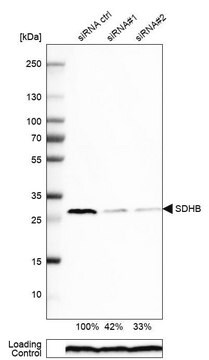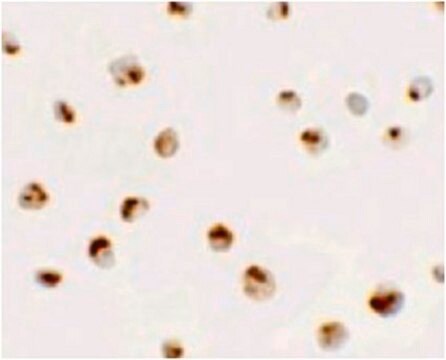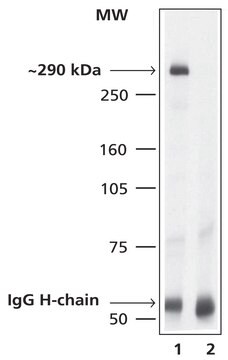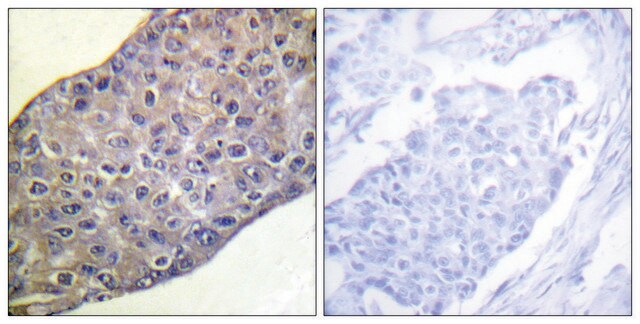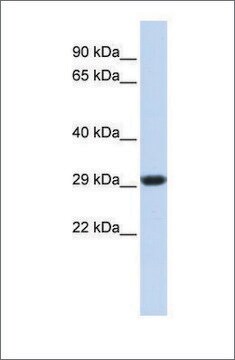推荐产品
生物源
rabbit
品質等級
共軛
unconjugated
抗體表格
affinity isolated antibody
抗體產品種類
primary antibodies
無性繁殖
polyclonal
產品線
Prestige Antibodies® Powered by Atlas Antibodies
形狀
buffered aqueous glycerol solution
物種活性
human
技術
immunohistochemistry: 1:20- 1:50
免疫原序列
RTPVVRPAHISAFLQDRPIPEWCGVQHIHLSPSHHSGSKAASLHW
UniProt登錄號
運輸包裝
wet ice
儲存溫度
−20°C
目標翻譯後修改
unmodified
基因資訊
human ... SDHD(6392)
一般說明
Succinate dehydrogenase complex subunit D (SDHD) gene encodes for a protein SDHD. It is a small sub unit of the cytochrome b, that is involved in the complex II of mitochondrial respiration. It is located at 11q23.1 on the human chromosome.
免疫原
Succinate dehydrogenase complex subunit D recombinant protein epitope signature tag (PrEST)
應用
Anti-SDHD antibody produced in rabbit has been used in immunohistochemistry.
生化/生理作用
Mutation in this gene leads to paraganglioma and phaeochromocytoma.
特點和優勢
Prestige Antibodies® are highly characterized and extensively validated antibodies with the added benefit of all available characterization data for each target being accessible via the Human Protein Atlas portal linked just below the product name at the top of this page. The uniqueness and low cross-reactivity of the Prestige Antibodies® to other proteins are due to a thorough selection of antigen regions, affinity purification, and stringent selection. Prestige antigen controls are available for every corresponding Prestige Antibody and can be found in the linkage section.
Every Prestige Antibody is tested in the following ways:
Every Prestige Antibody is tested in the following ways:
- IHC tissue array of 44 normal human tissues and 20 of the most common cancer type tissues.
- Protein array of 364 human recombinant protein fragments.
聯結
Corresponding Antigen APREST84465
外觀
Solution in phosphate buffered saline, pH 7.2, containing 40% glycerol and 0.02% sodium azide.
法律資訊
Prestige Antibodies is a registered trademark of Merck KGaA, Darmstadt, Germany
免責聲明
Unless otherwise stated in our catalog or other company documentation accompanying the product(s), our products are intended for research use only and are not to be used for any other purpose, which includes but is not limited to, unauthorized commercial uses, in vitro diagnostic uses, ex vivo or in vivo therapeutic uses or any type of consumption or application to humans or animals.
未找到合适的产品?
试试我们的产品选型工具.
儲存類別代碼
10 - Combustible liquids
水污染物質分類(WGK)
WGK 1
閃點(°F)
Not applicable
閃點(°C)
Not applicable
Analysis of the SDHD gene, the susceptibility gene for familial paraganglioma syndrome (PGL1), in pheochromocytomas
Aguiar R C T, et al.
The Journal of Clinical Endocrinology and Metabolism, 86(6), 2890-2894 (2001)
In vivo detection of succinate by magnetic resonance spectroscopy as a hallmark of SDHx mutations in paraganglioma
Lussey L C, et al.
Clinical Cancer Research, 22(5), 1120-1129 (2016)
Risk assessment of maternally inherited SDHD paraganglioma and phaeochromocytoma
Burnichon N, et al.
Journal of medical Genetics, 54(2), 125-133 (2017)
Charlotte Lussey-Lepoutre et al.
Clinical cancer research : an official journal of the American Association for Cancer Research, 22(5), 1120-1129 (2015-10-23)
Germline mutations in genes encoding mitochondrial succinate dehydrogenase (SDH) are found in patients with paragangliomas, pheochromocytomas, gastrointestinal stromal tumors, and renal cancers. SDH inactivation leads to a massive accumulation of succinate, acting as an oncometabolite and which levels, assessed on
Mélanie Menara et al.
The Journal of clinical endocrinology and metabolism, 100(2), E287-E291 (2014-11-19)
Pheochromocytomas (PCC) and paragangliomas (PGL) may be caused by a germline mutation in 12 different predisposing genes. We previously reported that immunohistochemistry is a useful approach to detect patients harboring SDHx mutations. SDHA immunostaining is negative in SDHA-mutated tumors only
Global Trade Item Number
| 货号 | GTIN |
|---|---|
| HPA045727-100UL | 4061836333096 |
| HPA045727-25UL | 4061841497998 |
我们的科学家团队拥有各种研究领域经验,包括生命科学、材料科学、化学合成、色谱、分析及许多其他领域.
联系客户支持